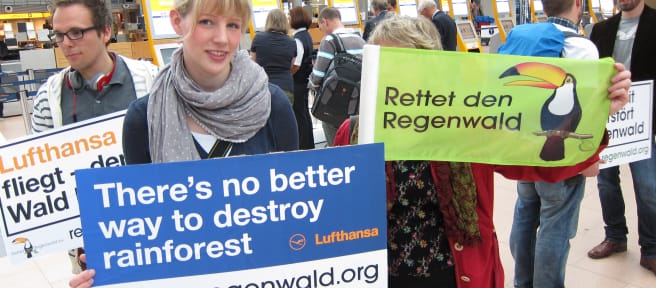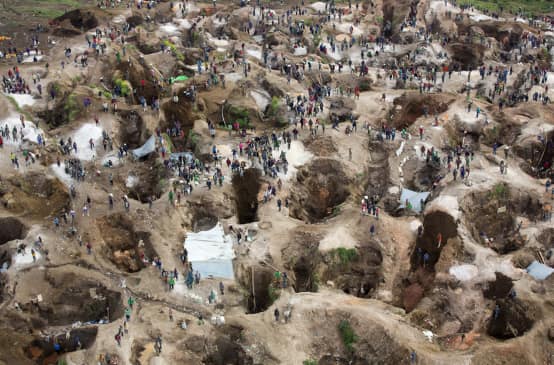Completed campaign
Lufthansa’s green claims don’t fly
A new danger is descending on tropical forests — deforestation by the airline industry. In the guise of environmental protection, airlines want to start taking off with jatropha, camelina and palm oil. Both of which are harvested from plantations created by cutting down trees and driving local farmers from their land. Lufthansa has taken a pioneering role. On July 15, the first Airbus 321 to use the so-called biofuel is scheduled to take off. Please sign our protest action.
News and updatesUPDATE: On July 15th, Rettet den Regenwald (Rainforest Rescue) and more than 20 supporters demonstrated against Lufthansa's first flight with so-called biofuels on Hamburg Airport. Read the news here
Flying uses large quantities of fuel and damages the environment. Lufthansa alone uses up to 30 million litres of petroleum-based kerosene, blasting massive amounts of environmentally damaging exhaust gases into the Earth's atmosphere. The airline is now trying to sweep its damaging emissions under the green "biofuel" rug. Its pilot project, Burnfair, received 2.5 million euros of taxpayer money from Germany's Federal Ministry of Economics and Technology.
How many studies do politicians and corporations need before they understand that when we make fuel out of plants, we heat up the earth, because tropical forests and savannas are cleared to create plantations. This displaces millions of people, exterminates animal and plant species, and poisons the earth and our drinking water with pesticides. Hunger is made intensified around the world because the fields are used for growing energy plants instead of food crops.
These are all well-known facts, but they are ignored by decision makers, even when the information is coming from their own ranks. Not one, but four new studies the EU has commissioned experts to conduct on biofuels show that they clearly do not fulfil the EU's climate goals. The studies have leaked out and were quoted last Friday by Reuters.The analysis show the EU biofuel targets may lead to an indirect one-off release of around 1,000 megatonnes of carbon dioxide -- more than twice the annual emissions of Germany.
Lufthansa has also decided to fly in the face of science. Starting July 15th, a Lufthansa Airbus 321 will fly between Hamburg and Frankfurt four times a day on so-called biofuel. A mixture of kerosene, vegetable oils, and animal fats will be tested high in the sky for 6 months on regularly scheduled flights. But which vegetable oils are actually in use and where they are from is a secret that the German airline does not wish to reveal until take off.
Environmentally friendly fuel is an illusion. The alternative is to simply fly less. Rettet den Regenwald (Rainforest Rescue) requests Lufthansa and the German Ministry of Economics and Technology to stop this agricultural fuel project immediately.
To
Deutsche Lufthansa AG
Dr. Christoph Franz, CEO and Chairman of the Executive Board of Lufthansa AG
Von-Gablenz-Str. 2–6, 50679 Cologne
Tel.: +49 (0)221-8260; Fax: +49 (0)221-8263 818
Federal Ministry of Economics and Technology
Mr. Philipp Rösler, Minister of Economics and Technology
11019 Berlin
Tel.: +49 (0)30-18 615 0; Fax: +49 (0)30-18 615 7010
Dear Mr. Franz, Dear Mr. Rösler,
Please put an end to Lufthansa AG's burnfair biofuel project. No matter whether it's jatropha, palm oil, or rapeseed oil in the tanks — agrofuels are never CO2 neutral. Fuel made from vegetable oils causes even higher emissions than petroleum-based diesel fuel. Using biofuel causes irreparable damage to people, the environment, and our climate.
The Finnish company Neste, which supplies Lufthansa with the agrofuel, uses mostly palm oil. Even the jatropha oil Lufthansa described involves the destruction of tropical dry forests and savannas, and the eviction of peasant farmers. Environmentally friendly fuel is hardly anything more than an advertising slogan and no alternative to fossil fuels.
Please stop the agrofuel project.
Sincerely,


